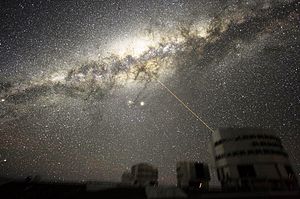
I was out in the back yard this evening looking up at the few stars I can see inside the city limits, and I remembered being a child on the farm back home in Deming, New Mexico. We lived out in the country, about eight miles from town, and it was easy on a clear night to see the froth of the Milky Way, along with what to my young mind were thousands of stars. I remember asking my father how many stars there were. He said he didn't know.
Nor did I have any concept of much more than the solar system, which we learned about in school. Keep in mind this was probably back in the late 1950s, so even astronomers could only wonder just what conditions existed on the nearest planets to us. And of course, popular science fiction of the day had Martians living on the red planet. Soon, I learned that all those stars I could see, and even the Milky Way were made up of stars, so far away their accumulation from Earth just looked like a brightly lit cloud—that is, with the naked eye.
It's difficult to believe that in just ten or twelve years, we would have a man on the moon. Even in grade school we got to watch the launch of the rockets that took our astronauts into orbit. It was the space age! One day we would go to Mars.
So, when I was a child, I understood as a child, and I asked the kind of questions a child would ask about the universe. How big is it? And if I were told that it was endless, I had a difficult time grasping endlessness. I hasten to add that as an adult, I only have a layman's understanding of the universe. But that understanding is well beyond what the Bible teaches—and that's totally understandable, because Genesis is based on man's understanding of the universe (creation) from only a few thousand years ago, when all observation was done through the naked eye; and to someone on Earth, it would appear and be difficult to imagine that the sun did not revolve around the Earth. It came up in the morning and went down in the evening, and to the ancient understanding, the morning and evening were the first day, etc., according to Genesis.
A companion understanding to ancient men was the idea that the Earth was actually flat, and it was not hard to conceive of a hades below the Earth and a heaven above the Earth. It wasn't until Copernicus in the fifteen hundreds that the Earth was displaced from the center of the universe, who also displaced the Ptolemaic system (which astrology is based upon) with the Earth at the center, and the planets, sun, and moon, and even the wheel of heaven (the stars) revolving around the Earth. It was a comforting, popular believe system of direct observation with the naked eye that made its way into the Bible, and it was a system that held sway for well over a millennia and a half. Even now, those who are fundamentally religious and believe that the Bible is the literal words of God don't question this scheme.
But what astounds me is the vastness of the "Universe." I simply cannot get into physics or even much about modern astronomy, nor the wonders of the Hubble Telescope and what it shows us, because I am neither an astronomer, nor a physicist, but as an adult with an adult layman's understanding I know this.
Our sun is but one star in the spiral galaxy, the Milky Way, and what I saw as a child out on the farm when I saw the Milky Way was a view of the center of the galaxy. I know that the sun (Sol) is at least ninety-three million miles from Earth, and it takes the light from the sun about eight light minutes to reach us. Light travels at approximately 186,000 miles per second, so in that eight minutes, with each second representing 186,000 miles, light travels ninety-three million miles in eight minutes. And yet Proxima Centauri, the closest star to our sun is four light years from us. That's the nearest star, and the light from that star takes light traveling at 186,000 miles per second four years made up of all those seconds, with each second representing 186,000 miles four years to reach us.
 |
Artist's conception of the Milky Way Galaxy
100,000 light years across and 1,000
light years thick.
|
But the implications of such distances is clear. Our own galaxy is big-ass big, inexpressibly vast, but what is even more astounding, the observable universe is made up of two hundred billion galaxies. And what of the distance of interstellar space between them?
Our Earth is an outpost planet on the outer band of the Milky Way Galaxy, just one of hundreds of billions of galaxies. I therefore find it a lot more likely than what the Bible teaches that we mammalian humans on this planet are just aliens from outer space, and it's very likely that there are trillions of planets in the observable universe in those hundreds of billions of galaxies that have evolved intelligent life.
I say...bring 'em on!

